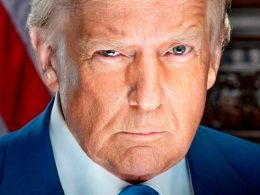Unlock the White House Watch newsletter for free
Your guide to what the 2024 US election means for Washington and the world
Happy Thursday. This week, a man who took satisfaction in an insurrection against the US on his behalf became the 47th US president. His sidekick, the world’s richest man, dabbled in fascist-style salutations. Apart from that, how is everyone feeling?
A lot of fearful attention is being paid to what Donald Trump might do with tariffs. Rightly so; he is, after all, the self-declared “tariff man” (on which, do listen to Alan Beattie’s podcast interview with tariff guru Doug Irwin). But there is a risk of being all-consumed by trade policy when there are many other economic challenges on the way.
Already, Trump has fired a few shots across the world’s bows concerning economic matters that were hardly debated in the months before his return to the White House. By executive order, he has jettisoned (the US’s participation in) the global deal on multinational corporate taxation that his first administration did a very good job of advancing. Too few paid attention to the signs, although his nominee for Treasury secretary, Scott Bessent, railed against the deal in his appointment hearing. Trump himself now vows retaliation against countries that push ahead with taxing US multinationals’ profits in their territories.
Another economic consequence for the rest of the world that has barely been thought about is that his promised crackdown on immigration could redirect large immigration flows from Latin America towards Europe, as my colleague Laura Dubois wrote about last week.
So it’s overdue, I think, to survey what could come our way that we at present least expect. In short, what are the black swans of Trumponomics? Below are some of my suggestions, though I suppose once we recognise them, they are no longer strictly speaking black swans. The “grey swans” of Trumponomics, perhaps? Here we go.
-
An oil and gas price collapse “Drill, baby, drill” made it into Trump’s inaugural speech, and there is no doubt he will do all he can to boost both the production and export of hydrocarbons. One of the executive orders signed by Joe Biden that Trump cancelled on his first day as president was a permitting moratorium for natural gas liquefaction plants. Trump, who wants Europe to buy more US liquefied natural gas, knows that his wish could run up against America’s own export capacity constraints. So his actions are likely to lower prices (though, admittedly, some think US oil production is close to maxed out). At the same time, the peak in China’s fossil fuel needs seems to be coming closer — and there is spare capacity in the Opec bloc of oil-producing countries. One might think Trump would not want to flood the market, but something tells me this guy cares about volumes above all. And if falling prices and US competition put pressure on Russia’s income, what’s not to like?
-
A hot carbon trade war Trump linked his boost for hydrocarbons with a push for US manufacturing: “America will be a manufacturing nation once again, and we have something that no other manufacturing nation will ever have — the largest amount of oil and gas of any country on earth — and we are going to use it . . . We will be a rich nation again, and it is that liquid gold under our feet that will help to do it.”
This is precisely what Europeans have feared: that cheaper energy in other regions allows competitors to undercut their manufacturing exporters in global markets. There may not be much Europe can do about that, but it can at least make sure fossil energy-intensive US products don’t undercut them in their home market too! Cue CBAM, the EU’s incoming carbon tariff, which only applies to a handful of raw materials. There will be huge pressure to extend it to manufactured goods to protect against the dirtier production methods of both the US and China, which could build into a full-fledged trade war driven by differences in climate and energy policy. -
A social media ‘splinternet’ We all know about Big Tech’s sway with Trump. What I hadn’t been fully aware of is how much of their support has to do with wanting him to stop the EU from being mean to them, I mean regulating to make their products safe. (Ross Douthat’s interview with Marc Andreessen in the New York Times is eye-opening in many ways.) So the low-level confrontation that has been going on for years is likely to blow up into full-on conflict. How will the EU react? Brussels’ move to “review” ongoing probes into Big Tech is a worrying sign it doesn’t have the stomach for a fight. But we have just seen several examples of governments’ ability (which David Allen Green analysed in the FT recently) to simply get social media switched off, including the US itself! And at Davos, Spain’s prime minister has just come out hard against social media companies. So don’t rule out jurisdictions in Europe or elsewhere determining that with what the US and some of its internet services are turning into, they are better off without them.
-
High noon for digital money Related to this is the new US oligarchy’s enamourment with crypto. They will no doubt push against any attempts to crack down on the industry around the world. In Europe, I hear a lot of justified concern in particular about US stablecoins — blockchain assets ostensibly pegged to the US dollar. There is plenty of interest in the US crypto industry to make these a go-to means of payments globally, and there are worries in other countries that this may encroach on the use of conventional money in their own currencies. The EU’s response is a very concerted if not widely known effort at the European Central Bank to ready an official digital euro; China and some other countries are doing the same thing with their national currencies. A showdown in global payments between private USD stablecoins and central bank digital currencies from other jurisdictions is not at all inconceivable — and could have larger economic and political repercussions than many expect.
-
Spillovers from the war on drugs Trump has declared an emergency on the US’s southern border and designated drug cartels as terrorist organisations. The latter move shows that the tough talk on border control is not just about immigration but also about drugs. Much like the point about migrants above, if Trump really does make things a lot harder for the drug trade, expect its linchpins to look for other markets to expand into. So the global criminal drug economy could be restructured, and Europe’s already unwieldy drugs challenge could suddenly worsen.
Then there’s the big one: the end of US democracy. It’s hard to even begin to think about what the economic repercussions would be and, frankly, that is not the biggest thing to be concerned about. It is also in the nature of black swans that they are hard to spot or even imagine. For both reasons, my “grey swans” list is necessarily incomplete. So send us yours to freelunch@ft.com.
Other readables
-
Gazans return home . . . to nothing.
-
Anjli Raval tells chief executives to look at their own fear of risk-taking, not just complain about bad government policies.
-
Meet the factions of the Republican party that will be slugging it out over the next four years.
-
Sarah O’Connor points out an inconvenient fact in the Labour party’s attempt at boosterism: if you promise productivity growth, you shouldn’t be promising too many jobs.
-
The boss of the world’s biggest sovereign wealth fund is fed up with quarterly reporting of corporate finances.
Recommended newsletters for you
Source link









